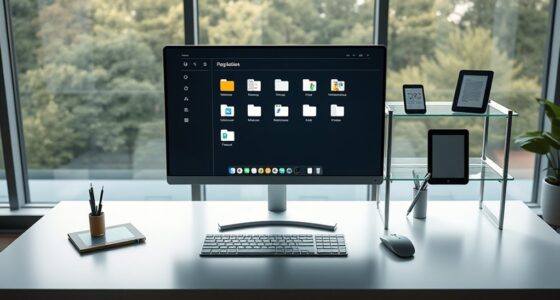To maximize deductions and stay compliant, make timely estimated payments based on your income projections to avoid penalties. Keep detailed records of all income sources and expenses, including receipts and invoices, to guarantee accurate tax filing and claim all eligible deductions. Regularly review and adjust your payments and records to reflect income fluctuations. By staying proactive with your tax strategies, you’ll reduce stress and keep more of your earnings—more tips await if you keep going.
Key Takeaways
- Track all income sources and expenses meticulously for accurate deductions and compliance.
- Make quarterly estimated tax payments to avoid penalties and ensure smooth cash flow.
- Keep detailed records and receipts to substantiate deductions and streamline tax filing.
- Understand deductible expenses like supplies, travel, home office costs, and equipment.
- Regularly review and adjust estimated payments based on income fluctuations to stay compliant.

Are you making the most of your tax situation as a freelancer? If not, you might be leaving money on the table or risking penalties. One key area to focus on is managing your quarterly estimated payments. As a freelancer, you’re responsible for paying taxes throughout the year, not just at tax time. Making timely quarterly estimated payments helps you avoid a large, unexpected bill in April and potential penalties for underpayment. To do this effectively, you need to estimate your income accurately each quarter and send payments on time. Staying proactive with these payments ensures you stay compliant and keeps your cash flow manageable. Ignoring this can result in fines or interest charges, which eat into your earnings. So, set reminders, review your income regularly, and adjust your payments if your income fluctuates. Regular adjustments can prevent overpaying or underpaying and help you better manage your finances.
Another critical aspect is adopting recordkeeping best practices. Good records are the foundation for accurate tax filings and maximizing deductions. Keep track of all income sources, including invoices, bank deposits, and PayPal transactions. Equally important is maintaining receipts and proof of expenses like supplies, equipment, travel, and home office costs. The more organized your records, the easier it becomes to identify deductible expenses and substantiate them if audited. Use digital tools or apps to categorize and store receipts, and reconcile your accounts regularly. This reduces the risk of missing deductions or losing receipts when you need them most. Also, separate your business and personal finances by opening dedicated bank accounts and credit cards. This simplifies recordkeeping and provides a clear audit trail. When tax season arrives, having detailed, organized records makes preparing your return less stressful and more accurate. Staying organized can also help you spot potential deductions related to your equipment and operational costs, which is especially important given the significance of best heat pump features that contribute to energy efficiency and savings.
Being diligent with your recordkeeping and making quarterly estimated payments might seem tedious, but they are essential for a smooth tax experience. They help you avoid surprises in April, ensure you’re paying the right amount of taxes, and keep you compliant with IRS rules. Over time, these habits will become second nature and save you both time and money. Remember, staying organized with your records and making timely payments not only minimizes your stress but also helps you take full advantage of deductions you qualify for. In the end, managing your taxes proactively ensures you keep more of your hard-earned income and stay out of trouble with the IRS. Taking these steps now sets a solid foundation for your freelancing business’s financial health and allows you to focus more on growing and thriving in your work.
Frequently Asked Questions
How Often Should I File Estimated Taxes as a Freelancer?
You should file estimated taxes quarterly to stay compliant and avoid penalties. The IRS recommends making payments four times a year, typically in April, June, September, and January. By sticking to this schedule, you guarantee your taxes are paid on time, reducing the risk of penalties for underpayment. Keep track of your income each quarter and make your payments promptly to stay ahead and avoid surprises at tax time.
Can I Deduct Home Office Expenses if I Share My Workspace?
Sharing your workspace doesn’t disqualify you from deducting home office expenses. If you use a part of your shared space exclusively for work, you can claim deductions under office sharing rules. Just guarantee the area is regularly used for business and not personal. Keep detailed records of your workspace usage and expenses, so you can confidently claim the appropriate deductions, maximizing your tax savings while maintaining compliance.
What Records Should I Keep for Freelance Income Verification?
You should keep detailed receipts and documentation for all freelance income. Maintain accurate income logs that record each payment received, including dates, amounts, and sources. These records help verify your income if you’re ever audited and guarantee you’re reporting correctly for tax purposes. Organize digital copies or physical files securely, and regularly update your records to stay compliant and make tax season smoother.
Are There Specific Tax Credits Available for Freelancers?
Think of tax credits as hidden treasures waiting for you to find. As a freelancer, you might qualify for industry-specific credits or state-level incentives that can profoundly reduce your tax bill. These credits vary by location and profession, so explore options like research grants or renewable energy incentives relevant to your work. Staying informed helps you access every opportunity, turning potential tax burdens into savings that make your freelance journey more rewarding.
How Does Self-Employment Tax Impact My Overall Tax Liability?
Self-employment tax directly impacts your overall tax liability because it covers Social Security and Medicare contributions. When you earn income as a freelancer, you’re responsible for paying both the employer and employee portions of these taxes. This additional cost increases your total tax liability, so it’s essential to plan ahead. By setting aside a portion of your income, you can better manage the self-employment tax and avoid surprises at tax time.
Conclusion
Think of your freelance tax journey as steering a ship through calm waters. By understanding deductions and staying compliant, you’re charting a course toward financial stability and peace of mind. Keep your records organized, claim every eligible expense, and don’t shy away from professional advice when needed. With these strategies, you’ll navigate tax season smoothly, avoiding storms and reaching your destination confidently. Your freelance voyage is all about staying on course—steady, prepared, and in control.









